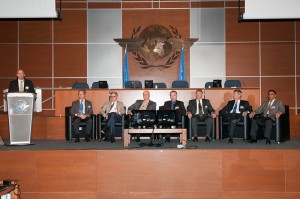ICAO is continuing to focus its operational safety efforts on three main priorities: runway safety, Controlled Flight Into Terrain and Loss of Control In-flight. Recent actions on these challenges have contributed significantly to related reductions in global/annual aviation fatalities and provide important contributions to the overarching priorities established in the ICAO Global Aviation Safety Plan.

The president of Aviation Performance Solutions LLC (APS), Paul BJ Ransbury, was asked by ICAO to provide a presentation to airlines and global training experts on the Gold Standard in On-aeroplane Upset Prevention & Recovery Training. Mr. Ransbury was part of panel of industry experts on the first session of Day 3 (Session 9) comprised of the following industry experts and with the FAA’s Rob Burke moderating. Rob is the Manager, Air Carrier Training Systems and Voluntary Safety Programs Branch (AFS-280). Panel members;
- Air Line Pilots Association (Bryan Burks),
- FAA (Jeff Schroeder – Chief Scientific and Technical Advisor for Flight Simulation Systems),
- CAE (Lou Nemeth – Chief Safety Officer),
- Aviation Performance Solutions (Paul BJ Ransbury – President),
- Bombardier (Steven Stowe – Senior Engineering Test Pilot),
- Delta Air Lines (Jon Tovani – Managing Director – Flight Training) and
- CAE (Itash Samani – Global Head of Regulatory Affairs).
Gold Standard in On-aircraft Upset Prevention & Recovery Training
 The Gold Standard in On-aircraft Upset Prevention & Recovery Training presented by APS and CAE integrated all aspects of the recently released ICAO Manual on Aeroplane Upset Prevention & Recovery Training (ICAO Manual). As APS already delivers full solutions in all aspects of the ICAO Manual (see Page 4 of the attached presentation), a summarizing briefing on what the final rollout will look like 2 to 5 years in the future was very valuable to the global experts at this meeting.
The Gold Standard in On-aircraft Upset Prevention & Recovery Training presented by APS and CAE integrated all aspects of the recently released ICAO Manual on Aeroplane Upset Prevention & Recovery Training (ICAO Manual). As APS already delivers full solutions in all aspects of the ICAO Manual (see Page 4 of the attached presentation), a summarizing briefing on what the final rollout will look like 2 to 5 years in the future was very valuable to the global experts at this meeting.
Additionally, APS addressed the future consideration of training assets not yet comprehended by the ICAO Manual and how they could be valuably plugged into the ICAO Manual footprint in a complimentary and supportive manner. However, it would require these training providers to meet the standards, quality assurance and content requirements of industry-approved training. Most ancillary providers currently believe themselves to be stand-alone solutions using exclusively either academic training, on-aircraft training or flight simulation training device / simulator training. Years of research since 2009 by global industry working groups (ICAO, FAA, ICATEE, EASA, and nearly 40 other organizations) have definitively concluded that no single solution exists. Comprehensive UPRT requires the industry-compliant integration of specialized academics, on-aircraft (piston or jet) and flight simulator loss of control in-flight training solutions.
More About this Meeting
ICAO Loss of Control In-flight Symposium 2014
ICAO’s Loss of Control In-flight (LOCI) Symposium (20-22 May 2014) saw pilots, operators, regulators and training organizations gather at the Organization’s Montreal HQ to explore a range of topics relating to this global safety priority while being provided with a cross-section of ICAO’s latest LOCI-related guidance and tools.
The Symposium showcased work being undertaken throughout the industry that addresses individual and crew strategies, operational countermeasures, as well as training and educational approaches to prevent and recover from a loss of control in-flight.
 “An accident caused by the loss of control of an aircraft in-flight is very rare,” explained Nancy Graham, Director of ICAO’s Air Navigation Bureau, “but over the last eight years these accidents have resulted in more fatalities in scheduled commercial operations than any other type, including runway incursions, runway excursions and controlled flight into terrain. It’s because of its association with high fatalities that LOCI is now the number one issue in aviation today.”
“An accident caused by the loss of control of an aircraft in-flight is very rare,” explained Nancy Graham, Director of ICAO’s Air Navigation Bureau, “but over the last eight years these accidents have resulted in more fatalities in scheduled commercial operations than any other type, including runway incursions, runway excursions and controlled flight into terrain. It’s because of its association with high fatalities that LOCI is now the number one issue in aviation today.”
ICAO, through its Global Aviation Safety Plan (GASP), has already developed a programme for Controlled Flight Into Terrain and continues to address Runway Safety priorities through an intensively collaborative action programme that has thus far delivered excellent results. LOCI, however, represents what is arguably one of the most complicated areas of aviation today and could pose more significant challenges as the global air transport community seeks to come to terms with it.
“Pilots lose control of an aircraft from a combination of several factors,” continued Graham, “but human performance factors especially, such as the way pilots maintain their attention across long flights, the way they respond to unexpected events and the way they interact with flight deck displays and controls, all need to be considered. Basically aviation trains pilots and controllers for what the airplane is supposed to do, not for what it’s not supposed to do.”




Comments: